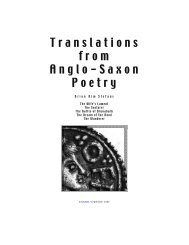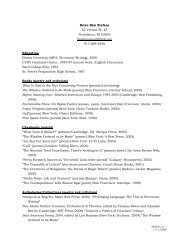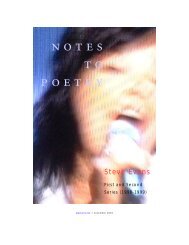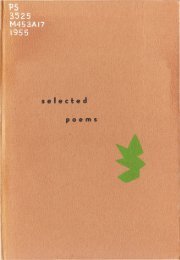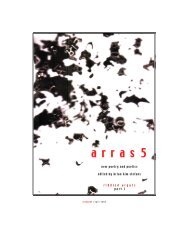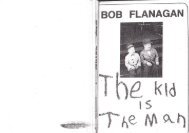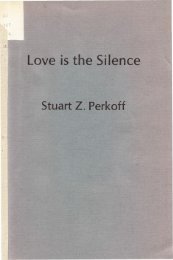new poetry and poetics edited by brian kim stefans - Arras.net
new poetry and poetics edited by brian kim stefans - Arras.net
new poetry and poetics edited by brian kim stefans - Arras.net
Create successful ePaper yourself
Turn your PDF publications into a flip-book with our unique Google optimized e-Paper software.
thumbnail sketch of “sore models” that I’ve probably unnerved you with, how do<br />
you see this project in relation to politicized opacities of language writing? Do<br />
you see the poems as an attempt to rearticulate the lyrical, or even the pastoral?<br />
Considering the various moves into <strong>and</strong> then out of a domestic space, from the<br />
personal to the social (each corrupting the other) how do you see the work in<br />
relation to Foucauldian notions of power, ie. as coming from that which escapes<br />
the panoptic gaze, <strong>and</strong> is more disparate rather than consolidated? Maybe you<br />
could discuss your poetic development —what were you reading before this<br />
work, what have you given up as dead ends in your past —as well as your decision<br />
to work with a repeated form.<br />
MC: Golly! Well, I remember the origins of <strong>and</strong> lead-up to Sore Models quite<br />
clearly, altho I’m probably less able to explain why certain pieces (it’s a sequence<br />
of 28 12-line poems) contain the elements they do. I spent much of ‘94 reading<br />
everything I could get my h<strong>and</strong>s on <strong>by</strong>, among others, Bernadette Mayer, Clark<br />
Coolidge, Michael Gottlieb, Ted Greenwald, Ray DiPalma—<strong>by</strong> the end of the<br />
summer of that year I’d fallen so under the sway of Coolidge’s works in particular<br />
that, while I thought of my concerns as being, broadly, “what happens to<br />
word 1 when word 2 is put down beside it”, I just wasn’t producing interesting<br />
results—I certainly wasn’t able to make such a reductive syntax crackle with the<br />
electricity Coolidge does in his earlier books (also thinking about CC’s “Larry<br />
Eigner Notes”, I suppose—”a nounal/prepositional universe”...). I’d finished the<br />
manuscript of “Compositional Bonbons Placate” & was wondering what to<br />
write next, & I k<strong>new</strong> in some vague sense that I wanted it to be “different”.<br />
Then, in October, I made my first trip to the States &, while staying in<br />
Providence with Peter Gizzi & Elizabeth Willis, decided that, on my return, I<br />
would start work on a sequence. Sore Models owes its shape &, in a distorted way,<br />
its tone to my continuing admiration of Kit Robinson’s works, & to the fact that<br />
I was reading him on the plane back to the UK, so the feel of some of his works<br />
was uppermost in my mind when next I sat down to write. Also I wanted to see<br />
whether I could stick with something (a repeated form) for a few months without<br />
tiring of it.<br />
I’m not very knowledgeable about Robert Duncan’s works—the opening poem<br />
in Sore Models lifts phrases more or less verbatim from Umberto Eco’s Foucault’s<br />
Pendulum, while “6/1/95” opens with the beginning of a Donald Davidson essay<br />
on the role of adverbs as modifiers of semantic sense, before closing with a search<br />
for fuel which appears there, I think, as a result of dipping into Pynchon’s<br />
Gravity’s Rainbow. The poems were just built out of whatever was on my desk at<br />
the time. Pastoral elements? Hmmm—probably arose from a certain glumness at<br />
that time, the humour ditto (an attempt to rouse myself) while also, of course,<br />
relating to the occasional New Yorkiness of tone in Robinson’s work, which



